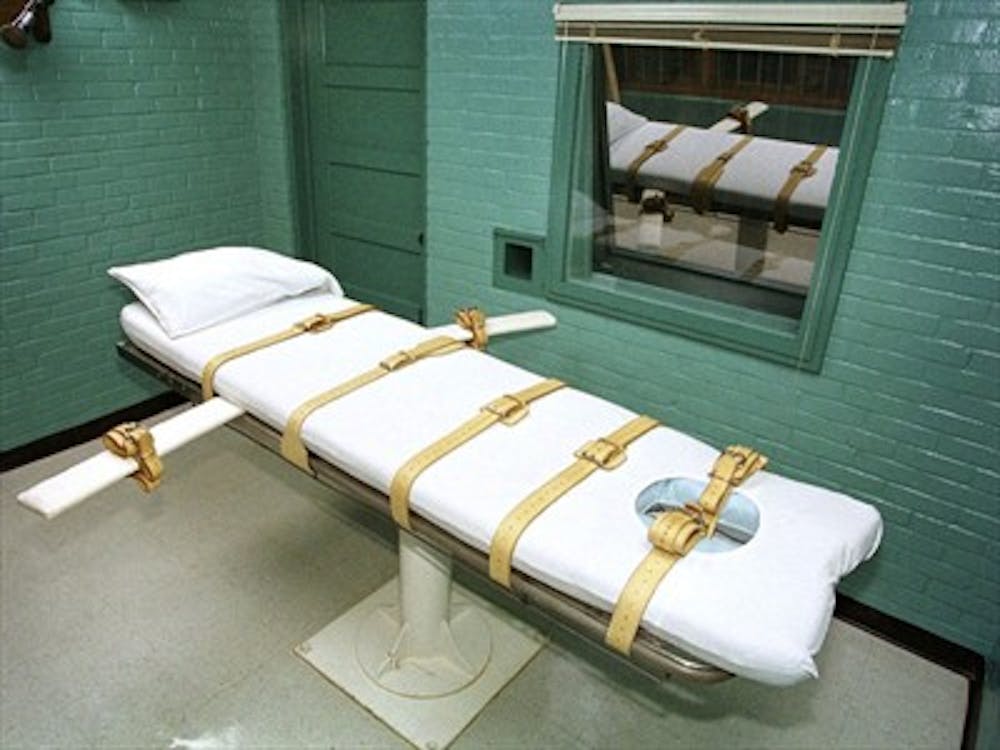By Abigail Pollock | Echo
A man was put to death on Wednesday.
Executions are not uncommon in the U.S. Joseph Paul Franklin was the 80th U.S. citizen to be executed since January 2012, according to the Death Penalty Information Center.
It is the nature of the execution that has received special attention.
Franklin was put to death with an injection of pentobarbital purchased from a compounding pharmacy, a loosely-regulated alternative to FDA-regulated pharmacies. Compounding pharmacies manufacture variations of drugs banned by larger companies-the products of which are untested and sometimes hazardous. Last year, compounding pharmacies came under scrutiny when steroid injections from a Massachusetts pharmacy killed 64 people in a meningitis outbreak, according to NBC News.
Nanette Laughrey, a federal judge, ruled to delay Franklin's execution on the basis that three different execution protocols had been ordered within the last three months, according to NBC.
"Franklin has been given no time to research the risk of pain . . . the quality of the pentobarbital provided, and the record of the source (of the drug)," Laughrey said.However, the stay was overruled by a federal appeals court and the Supreme Court, and Franklin was put to death. He was declared dead 10 minutes after the administration of the drug, according to NBC.
Several death row inmates have filed federal lawsuits to delay executions until drug protocols are reviewed, according to CNN. The case has been made that using untested drugs is "cruel and unusual punishment," which is a violation of the Eighth Amendment.
Another concern is that those mixing the chemicals in the pharmacy would tamper with the drug intentionally, knowing it was intended for a convicted criminal, according to NBC.
The unlawful torture case could be made regarding Florida inmate William Happ, who was executed last month through a new combination of drugs. The execution took 14 minutes to complete instead of the usual seven.
The Daily Mail reported that Happ moved around more after receiving the drugs than people executed using a different formula.
Lethal injection drugs available for executioners to purchase are becoming scarce. Recently, states have had to purchase the drugs from compounding pharmacies or try new, untested drug combinations on prisoners. Some states have even broken the law by falsifying prescriptions and lying to pharmacies to obtain the drugs, Al-Jazeera reported.A federal civil complaint has been filed against the Texas Department of Criminal Justice (TDCJ), which is responsible for executions in Texas, for violating state law by obtaining pentobarbital through a falsified prescription. The suit said the pharmacy was unaware of the purpose for the order and has requested the drugs be returned. Texas refused, according to a statement from TDCJ.
"The drugs were purchased legally by the agency. TDCJ has no intention of returning the pentobarbital," the TDCJ said in a statement, according to Al-Jazeera.
Loss of transparency is another major concern regarding states that use cash or false information to purchase drugs from disreputable or unnamed sources.
"If you mask executions in a shroud of secrecy, vital oversight is lost," Maya Foa, death penalty director for the Reprieve charity organization, told Al Jazeera.
"There is a risk that bad drugs could be used-and journalists, lawyers and the public would have no means of knowing what exactly is being injected into the prisoner," Foa added.Growing opposition to the death penalty, domestic and abroad, has caused the current scarcity of lethal injection drugs, according to Al-Jazeera.
Several major pharmaceutical companies have requested that their pentobarbital drug not be used for executions.
"Manufacturers have made it clear that they don't want their medicines-designed to save and improve lives-used to execute prisoners," said Maya Foa.
As drug sales to prisons and correctional departments were restricted, many states were pushed to rely solely on the anesthetic propofol to administer executions. Propofol is an essential hospital drug used for anesthesia, and the U.S. cannot afford to have the import of propofol restricted without putting hospitals at risk, according to Al-Jazeera.Then the European Union stepped in. Most propofol is manufactured in Europe, and the EU strictly opposes the death penalty, according to Al-Jazeera. The EU demanded that Missouri return its supply of propofol purchased from a Germany company, and threatened to limit all exports of propofol if its use in executions continued.
Pharmaceutical companies and the EU are not the only organizations who stand opposed to the death penalty. The death penalty is outlawed in 18 states, according to the Death Penalty Information Center.
Additionally, the number of Americans in favor of the death penalty is at its lowest point in over 40 years, with a 60 percent approval rating. It is down from a high of 80 percent in 1994, according to a Gallup poll published October 2013.



